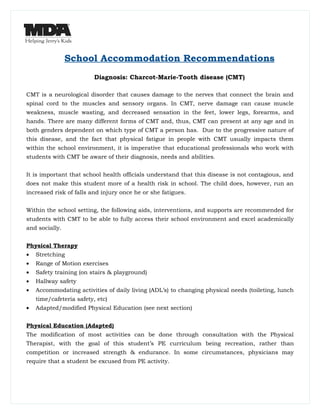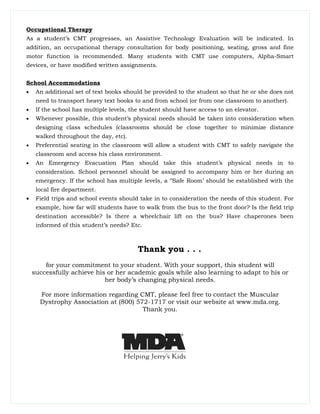School Accommodation Recommendations C
- 1. School Accommodation Recommendations Diagnosis: Charcot-Marie-Tooth disease (CMT) CMT is a neurological disorder that causes damage to the nerves that connect the brain and spinal cord to the muscles and sensory organs. In CMT, nerve damage can cause muscle weakness, muscle wasting, and decreased sensation in the feet, lower legs, forearms, and hands. There are many different forms of CMT and, thus, CMT can present at any age and in both genders dependent on which type of CMT a person has. Due to the progressive nature of this disease, and the fact that physical fatigue in people with CMT usually impacts them within the school environment, it is imperative that educational professionals who work with students with CMT be aware of their diagnosis, needs and abilities. It is important that school health officials understand that this disease is not contagious, and does not make this student more of a health risk in school. The child does, however, run an increased risk of falls and injury once he or she fatigues. Within the school setting, the following aids, interventions, and supports are recommended for students with CMT to be able to fully access their school environment and excel academically and socially. Physical Therapy • Stretching • Range of Motion exercises • Safety training (on stairs & playground) • Hallway safety • Accommodating activities of daily living (ADL’s) to changing physical needs (toileting, lunch time/cafeteria safety, etc) • Adapted/modified Physical Education (see next section) Physical Education (Adapted) The modification of most activities can be done through consultation with the Physical Therapist, with the goal of this student’s PE curriculum being recreation, rather than competition or increased strength & endurance. In some circumstances, physicians may require that a student be excused from PE activity.
- 2. Occupational Therapy As a student’s CMT progresses, an Assistive Technology Evaluation will be indicated. In addition, an occupational therapy consultation for body positioning, seating, gross and fine motor function is recommended. Many students with CMT use computers, Alpha-Smart devices, or have modified written assignments. School Accommodations • An additional set of text books should be provided to the student so that he or she does not need to transport heavy text books to and from school (or from one classroom to another). • If the school has multiple levels, the student should have access to an elevator. • Whenever possible, this student’s physical needs should be taken into consideration when designing class schedules (classrooms should be close together to minimize distance walked throughout the day, etc). • Preferential seating in the classroom will allow a student with CMT to safely navigate the classroom and access his class environment. • An Emergency Evacuation Plan should take this student’s physical needs in to consideration. School personnel should be assigned to accompany him or her during an emergency. If the school has multiple levels, a ‘’Safe Room’ should be established with the local fire department. • Field trips and school events should take in to consideration the needs of this student. For example, how far will students have to walk from the bus to the front door? Is the field trip destination accessible? Is there a wheelchair lift on the bus? Have chaperones been informed of this student’s needs? Etc. Thank you . . . for your commitment to your student. With your support, this student will successfully achieve his or her academic goals while also learning to adapt to his or her body’s changing physical needs. For more information regarding CMT, please feel free to contact the Muscular Dystrophy Association at (800) 572-1717 or visit our website at www.mda.org. Thank you.


